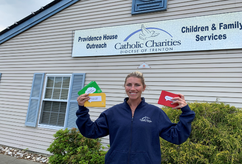 By: Shannon Kruse, Employment Specialist & Bice Del Galdo, Founder, ASD Solutions Inc. What is Neurodiversity? No two minds work the same; some minds are more unique than others. Just as with culture, gender, ethnicity, race etc., our mental functioning is just another difference that we all share. The idea that there is a “right” or “normal” type of brain is a myth. People would not say that there is a “right” or “wrong” culture, right? Neurodiversity works the same way. Some individuals’ cognitive functioning is just a little more unique than others. Neurodiversity is an umbrella concept that covers a wide range of cognitive differences such as ADHD, autism, Tourette’s, dyslexia, dyspraxia, and dyscalculia. It is a natural variation of human genetics. It is not a disorder that needs to be cured; it is a difference in brain function that can be an asset with the right accommodations and support. How is Neurodiversity an Asset? We need to break down the barriers that have been put up from the misconceptions of neurological differences and show employers that the strengths of neurodiversity outweigh the extra help that may need to be put in. Even though there may be some struggles with social interaction, which is one of the most frequently seen traits of a neurodivergent individual, they still have many talents; some of which may even be directly related to their distinctive neurology. Below is a list of common talents that people with neurodifferences have, which can be considered great assets to an employer: • Pattern Recognition • Memory and inferential reasoning • Appreciation for routine and repetition • Following directions very closely • High level of concentration • Detail orientation • Skilled in coding and other technology/data-driven processes • Ability to detect errors and see things that others may miss A neurodivergent individual can provide a unique point-of view to an employer. They can offer an innovative and creative perspective that neurotypical employees may not be able to provide. By bringing in different brain types and different ways of thinking companies are able to find unique ways to problem-solve. Neurodivergent individuals also demonstrate greater loyalty to an employer, greater reliability, better attendance record, as well as higher productivity and quality of work. Inclusive employers even understand and treat their other employees better because they are able to identify that every employee has individual needs and abilities, and this will increase employee morale. There are companies out there who have already seen the potential of neurodiversity! Many companies and large corporations have already begun to embrace neurodiversity. These employers have recognized the hard work, resilience, and determination that others have exhibited. For example, Microsoft has a Neurodiversity Hiring program where the interview process looks a little different; individuals get to demonstrate their strengths rather than having to talk about them in a traditional interview. This is called work simulations. Another more recent employer using this method in their hiring process is a business called Ultranauts. They are a software and data engineering firm where 75% of their team are on the Autism Spectrum. Another employer who is embracing neurodiversity is a laboratory called Cockroach. It is a database engineering lab that not only hires neurodivergent employees but also provides all its employees with training and resources on neurodiversity. Also, Ernst and Young Accounting has created a program where they are hiring autistic employees who have exceptional math skills. Other major companies such as Ford, SAP, Walgreens, Home Depot, and CVS have created similar initiatives as well. What can you do to reach your potential as a neurodivergent individual? One of the best ways to make sure that you reach your potential is by working with a job coach. You should team up with an organization, such as ASD Solutions that pairs you with a job coach to assist you in career planning, searching, and training. A job coach will guide you through evaluating your interests and abilities then researching jobs that match them. A coach will also help find the jobs of their choice. Finally, if desired, once you get the job, a coach can provide on-the job or off-the job support and training. The potential is within you! Interested in becoming an inclusive employer? What can you do? You will see, becoming an inclusive employer will be one of the best decisions you can make for your company. A great first step to becoming an inclusive employer is by accessing the Autism @ Work Playbook written by Hala Annabi, an associate professor at the University of Washington Information School. It is a compilation of organizational strategies, employment models, and hiring and onboarding practices from Microsoft, SAP, JPMorgan Chase and EY; all of whom have create neurodiversity initiatives. Once you have been able to create a plan for your program, partner with local community organizations such as ASD Solutions to be paired with a job coach who will assist you with recruiting new employees, on-the-job support and training for your new neurodivergent employees as well as train your other employees on neurodivergence and best practices for working with neurodivergent co-workers. Finally, keep open communication with your assigned job coach(es) because they will be there to assist your company with any questions or concerns that may come up. Community agencies are great resources to have to start and continue with your neurodiversity journey.
0 Comments
 By: Janet Werner, President, U Have My Word, LLC Who cares? Well, we all really care. We care about making it simple and easy to bring a smile and make a difference In Just a Mail Moment. We invite collaborations with business leaders, organizations and teams to ease the journey in your community service initiatives. This is why the WE CARE Collaboration was launched. The WE CARE collaboration is an outreach initiated by the Dale Caldwell Foundation and the U Have My Word LLC volunteer team. We give a heartfelt thank you to our Founding Business Sponsor Dax Strohmeyer, CEO, Triangle Manufacturing Company, Inc. for generously supporting this outreach. With the help of Dax and other collaborators, WE CARE is currently impacting thousands of NJ residents by multiplying the impact of caring words In Just a MAIL Moment™. "The question for me was not whether to give to charities, but to which ones. There are so many wonderful, creative, and necessary charities to give to today. I have a real passion for New Jersey and the people in it, so I was comforted that the Dale Caldwell Foundation 'We Care' project was going to start with their focus in New Jersey. Times have been hard for so many people, and I saw the ‘We Care’ project as a practical and easy way to touch thousands of people. You never know when a simple word of caring can make all the difference in the world," said Strohmeyer Our WE CARE initiative starts with Postcards From Home™. Why are postcards so unique and impactful? Did you know that the ‘Mail Moment’ is real and that we can leverage it in a simple way? People are hungry for personal connection and meaning in the day especially when they feel so isolated from social interaction. The Mail Moment has built in anticipation, pleasure, personal touch, undivided attention and is welcomed as a meaningful experience. Did you know that snail mail evokes emotion and connection? Studies around the United States show: • 67% feel mail is more personal than the Internet. • 56% say receiving mail is a real pleasure. • 55% of people look forward to the mail with anticipation and give it their undivided attention. • Mail is welcomed into homes and plays a unique personal role in their daily lives. • Mail offers an opportunity to create an emotional connection. (The Mail Moment-Pitney Bowes) How might we tap into the power of the Mail Moment and ease the journey in caring for the human heart? When you combine digital communication and snail mail interaction and engagement with the message increases? Postcards are easy to mail and easy to add to an email, text or social media communication increasing impact, retention and follow up action. At this time when we all would like a bit of ease in our day and ease in our outreach, Postcards From Home™ offer you an easy way to expand the impact of your community service initiatives. The WE CARE Collaboration taps into the positive impact of the MAIL Moment. Imagine opening your mailbox and noticing a simple colorful message that greets you with, ‘I care about you.’ Now imagine your employees working from home or driving home from work and opening their mailbox greeted by a message from you saying, ‘You are important to me.’ Next imagine your employees engaging in a postcard mailing party, sending hundreds of positive caring messages out into the community as a follow up to your service projects. What impact can you imagine this making on employee and community morale and multiplying a sense of esprit de corps? In one simple delivery of 1100 postcards to Providence House of Ocean County uplifting messages are being distributed to families of domestic violence when they receive food, clothing, and other supplies through Catholic Charities. Postcards From Home™, created by Janet Werner, started as an inspiration and heart desire to engage person to person from her home to the homes of others. This was not a postcard mailed from a vacation spot but a postcard from “my heart to your heart…from wherever I am to wherever you are.” Our team and mailed cards that said, I was just thinking of you…I have a lot of respect for you. When my son was stationed in Afghanistan, I mailed postcards to his base and imagined that even the soldier in the mail room just might feel a smile as the colorful message was handed out at mail pick up. For my son and the soldiers who he lived with, these postcards brought a sense of connection from home during difficult and often lonely days. My vision was and still is to create Miles & Miles of Peace & Smiles™ around New Jersey, across our nation and throughout the globe. During the COVID shutdown, the Dale Caldwell Foundation WE CARE initiative brought supplies of Postcards From Home™ to nursing homes, schools, hospitals, police units and other community agencies. The nursing home moments were especially heartfelt as senior residents who were isolated from their loved ones received supplies of postcards and stamps which positioned them with an action step that they could take along with an energy lift that made their day. Our seniors enjoyed giving cards to staff and their neighbors as well as mailing them to friends and family who were not able to visit. Since then, we have teamed up with more community organizations to multiply the mission of adding a smile to someone’s day. Who cares? We all care! We all really care! Our goal is to ease your journey in caring for the human heart as you invest in your own community service outreach. We invite a collaboration with you and your employees to explore how Postcards From Home™ might simplify and multiply the impact in your community service initiatives. The Dale Caldwell Foundation and U Have My Word LLC team have a strong history in collaboration and community outreach. We invite a conversation on how we might collaborate together with you in creating Miles & Miles of Peace & Smiles around New Jersey, across our nation and throughout the globe. Business sponsors like you already fund the delivery of positive healthy CARING services that nourish the mind, body and soul of our frontline heroes and throughout underserved communities. We offer you the opportunity to integrate caring cards into your current community outreach program and together expand the wonderful work you are already doing. We also know that there are companies that haven't yet been able to begin the community initiatives in the way that they would like to. It is our intent to make contact and connection easier by using digital and snail mail postcards. Our collaboration with the Dale Caldwell Foundation and NJ business leaders on this effort is in alignment with how our team envisions moving forward with the WE CARE initiative. We all care about caring and recognize the importance of being positive and its impact on mental health which now affects all of us. "It’s easy. It’s simple. And it’s profound. When my Dad was in rehab, he asked Janet to bring a supply of these postcards to him so that he could share them with the staff and other residents. When I saw how much these postcards meant to my Dad, I knew we were onto something deeply important that touched each of our souls, whether we were the one giving or the one receiving,” said Caldwell. How the WE CARE program works? When a business provides financial donations, our volunteers deliver a supply of postcards to a designated agency in the community which may include a hospital, police or fire department, homeless shelter, food pantry or any agency of your choice. We also deliver a supply of postcards to your place of work positioning your employees to send postcards to your established agency as a team engagement experience. We work with you to identify the best approach to get the positive words out. In the end, who cares? I care. You care. We all care. So, how can you get involved? With your financial support, The Dale Caldwell Foundation WE CARE fund can expand its reach to more veterans, active-duty military, police officers, food pantry programs, schools, universities and underserved communities. "I have such respect for and confidence in The Dale Caldwell Foundation,” said Strohmeyer. “The We Care program is so powerful because of its simplicity especially in today's world. How often do we hear these uplifting words in our day? I appreciate you...You can count on me. Imagine touching thousands of lives with words like these.” One of our newest partners is Hands In 4 Youth in West Milford, NJ where campers will be able to communicate home to their families this summer with their very own supply of postcards. Youth camps are a great opportunity for your funding support. Whether you want to start a new initiative, or integrate our postcards into your existing ones, I’d love to talk with you about the possibilities. Please email me to see how you can engage your employees and the community and touch lives with these simple messages. Janet Werner, President, U Have My Word LLC [email protected]  By Bill Passarotti, SVP, HUB International Northeast For real estate owners and managers, it has never been more important to strategize with an experienced insurance advisor well ahead of the next policy renewal. The habitational property insurance market was hit hard with catastrophic claims over the last few years, the result of hurricanes, wildfires, severe storms and water damage. Multi-family buildings also saw significant wind and hail claims as well as an uptick in normal fire and water damage. A hard or hardening market means increased scrutiny in underwriting, significant premium increases, and carriers less willing to write policies for properties with any significant risk. While the insurance marketplace has been hardening for several years now, the year 2020 was unlike any other. A global pandemic, domestic civil unrest, economic uncertainty, unprecedented natural disasters, soaring liability judgements and nuclear verdicts fueled by social inflation contributed to making a challenging marketplace even worse. It’s not just legacy facilities with older systems that are experiencing increased costs and reduced coverage options. Even new luxury high-rises are being turned down by carriers because of an uptick in water damage claims due to faulty new construction. Water damage has become so common that underwriters are now asking for separate water deductibles, often significantly higher than that of other perils. Fortunately, there are a number of risk management and insurance considerations to follow that can help your real estate portfolio look its best in the eyes of the underwriters:
Engaging in proactive risk management and understanding current insurance considerations can soften the habitational property insurance market for any portfolio. Now more than ever, it is imperative to work with your insurance advisor to review your coverages and to understand what your P&C policies cover, what they don’t and the best ways to mitigate the individual and unique risks of your properties. CIANJ member, Bill Passarotti, currently serves as Senior Vice President with leading global insurance brokerage, HUB International. Based out of Summit, NJ, Bill works with businesses in a wide variety of industries on custom-tailored, comprehensive risk & insurance solutions. He can be reached at 908-666-6200 or [email protected]. For more information on HUB International, please visit www.hubinternational.com.  By Michelle A. Schaap, Team Leader, Privacy & Data Security Practice Chiesa Shahinian & Giantomasi PC We do not have to read the Fact Sheet issued by the White House Briefing Room to know that the cybersecurity practices of Federal agencies and their vendors have been put to the test in the last several months and found to be wanting. Among the breaches we know about: the SolarWinds’ Orion compromise, which went undetected for more than 8 months; Microsoft Exchange’s vulnerability; and the Colonial Pipeline ransomware attack have left exposed the Nation’s lacking coordination when it comes to proactive measures, supply chain cyber resilience, breach detection capabilities, and incident response in the face of ongoing cyber-attacks whether from nation-states or cyber criminals. To address these very real concerns and risks, President Biden’s May 12 Executive Order will require software vendors and cloud providers that wish to continue to be awarded and/or to maintain sought-after government contracts to meet security standards that are consistent across agencies, and which require transparency, zero trust architecture, and mandatory reporting of breaches. As a cybersecurity attorney, I see the measures outlined in the Order to be necessary and appropriate in light of the ongoing attacks to our private and public sectors. Moreover, I hope these measures lead to national standards that ultimately replace the current patchwork quilt of thirty-plus proactive laws adopted by different states and disparate agencies’ procurement standards. The policy and goals set by the Executive Order are to improve the Federal government’s ability to “identify, deter, protect against, detect and respond” to cybersecurity threats, vulnerabilities, incidents and breaches. The policy further highlights the critical importance in this war against cyber-crime of the sharing of information between the public and private sectors, and will apply to federal agencies and their on-premises, cloud-based and hybrid resources. The end result will be that in approximately one year’s time, federal agencies will be required to implement best practices to secure their systems and software and, further, will require their software and cloud providers to do the same – both contractually and in practice. Agencies will be migrating to secure cloud environments and will be required to remove products and solutions that do not meet the final cybersecurity rules and criteria amending the Federal Acquisition Regulation (FAR). Legacy software will need to be updated unless a waiver is granted – and then only on a case-by-case basis. The expectation is that a standardized federal agency playbook for incident response and better, more coordinated threat gathering and sharing will enable federal agencies to prevent, detect, contain and respond more effectively to the cyber threats that continue to threaten our virtual shores and systems. Additionally, the Order will develop the IoT cybersecurity equivalent to the Consumer Product Safety Commission’s labeling requirements for consumer goods. It has been suggested that the private sector will follow the government’s lead and begin taking a closer look at its cloud providers’ and software vendors’ security and cybersecurity practices, even in the absence of legislation mandating this assessment. As such, companies in the space should be prepared for: • Requiring sharing of risk information • Mandatory reporting of cyber incidents • Required multi-factor authentication and encryption • Required disclosure of software components Those companies that cannot demonstrate that they have taken a privacy-by-design approach to their products and solutions and do not have a cybersecurity program in place may find that their customer prospects will be diminishing. Now is the time then for these companies to take stock and improve their posture on data protection and risk mitigation. |
Guest Blog
Archives
July 2024
Categories |
- About Us
- Events & Programs
-
Forums
- Diversity, Equity & Inclusion Forum
- Environmental Business Council
- Family-Owned Business Forum
- Healthcare Foum
- Higher Education Forum
- Human Resources Forum
- International Forum
- Manufacturing Forum
- Marketing Forum
- Next Gen: A Young Professionals Organization
- Non-Profit Forum
- Real Property Forum
- Technology for Business Forum
- Transportation Forum
- Women in Commerce Forum
- Membership
- COMMERCE Magazine
- Member Directory
- Member News
- Guest Blog
|
Copyright Commerce and Industry Association of New Jersey. All Rights Reserved.
365 West Passaic Street Suite 490 | Rochelle Park, NJ 07662 Phone: (201) 368-2100| [email protected] | sitemap |

 RSS Feed
RSS Feed
